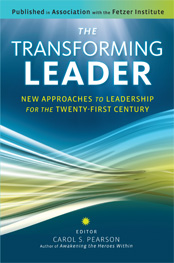
Carol S. Pearson, Ed., (2012). The Transforming Leader: New Approaches to Leadership for the Twenty-First Century. San Francisco: Barrett-Koehler Publishers, Inc.
 This is a book I had great hope for when I first learned of it. First, it was published by my favorite publisher of popular works on leadership and development. Second, it was edited by Carol Peterson who was reviewed in the pages of Integral Leadership Review, https://transdisciplinaryleadership.org/5280-fresh-perspective-leadership-and-archetypes-a-conversation-with-carol-s-pearson and has published on leadership and archetypes. Then, when I rece3ived it my excitement built as I saw some familiar names like Michael Jones (https://transdisciplinaryleadership.org/4763-feature-article-transforming-leadership-through-the-power-of-the-imagination), Barbara Mossberg, who is a meber of our Integral Leadership Council (https://transdisciplinaryleadership.org/1317-integral-leadership-council-member-12), Jonathan Reams, Editor of Integral Review (http://integral-review.org/)and author in Integral Leadership Review (https://transdisciplinaryleadership.org/5244-feature-article-leadership-as-opening-space), a colleague in past endeavors, Alan Briskin, and others, some familiar and others not.
This is a book I had great hope for when I first learned of it. First, it was published by my favorite publisher of popular works on leadership and development. Second, it was edited by Carol Peterson who was reviewed in the pages of Integral Leadership Review, https://transdisciplinaryleadership.org/5280-fresh-perspective-leadership-and-archetypes-a-conversation-with-carol-s-pearson and has published on leadership and archetypes. Then, when I rece3ived it my excitement built as I saw some familiar names like Michael Jones (https://transdisciplinaryleadership.org/4763-feature-article-transforming-leadership-through-the-power-of-the-imagination), Barbara Mossberg, who is a meber of our Integral Leadership Council (https://transdisciplinaryleadership.org/1317-integral-leadership-council-member-12), Jonathan Reams, Editor of Integral Review (http://integral-review.org/)and author in Integral Leadership Review (https://transdisciplinaryleadership.org/5244-feature-article-leadership-as-opening-space), a colleague in past endeavors, Alan Briskin, and others, some familiar and others not.
The book was sponsored by the Fetzger Institute with which some of these folks have had a long relationship. The introduction, not attributed, but presumably by the Editor, focuses on the individual as leader in a challenging world. The book is divided into three parts,
• Transformational Thinking for Twenty-First Century Leaders,
• Being the Change: Inner Work for Transforming Leaders, and
• The Art of Working with and Transforming Groups
So we consider the cognitive aspects of leading, such as Appreciative Inquiry practitioner Diana Whitney and Amanda Trosten-Bloom’s “Positive Power: Transforming Possibilities through Appreciative Leadership. We consider the interior individual in other ways, including a healthy dose of spirituality, including Susan Sepakowski’s “Mindful Leadership: Discovering Wisdom beyond Certainity,” which emerges from Buddhist traditions, and focusing on the collective, in the case the group level, including Stephen Aizenstat’s “Depth Entrepreneurship: Creating an Organization Out of Dream Space.” He is the founder of the Pacifica Graduate Institute, where editor Pearson teaches.
The unattributed Conclusion of the book, presumably by Pearson, includes the following observations:
1. We should “shift our attention from problems to vision; from what is lacking to noticing strengths; from blaming individuals to fostering structural and relational solutions; and from looking to others to make a difference to fully claiming our own responsibility for doing so.”
2.We are “ensouled creatures, who can respond to a call or sense of vocation that has meaning beyond just a way to get ahead.”
3. “We should be open about our waking and nightime dreams; stances that promote dialogue; strategies that groups can use to connect with their inner wisdom, the emotional and aesthetic side of leadership life; the pernicious ways we all project and how we need to withdraw those projects; and our capacity to see past our own or our group’s perspective to discover the larger relationships between people and groups where new possibilities lie.”
Here is a group that is getting the attention it deserves for fresh ways of thinking about leadership. Enthusiasm, where art thou? A bit of it is still there, along with some disappointments. Perhaps my greatest disappointment is that I was not invited to help shape or contribute to this volume. How’s that for owning you stuff?
